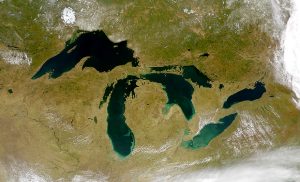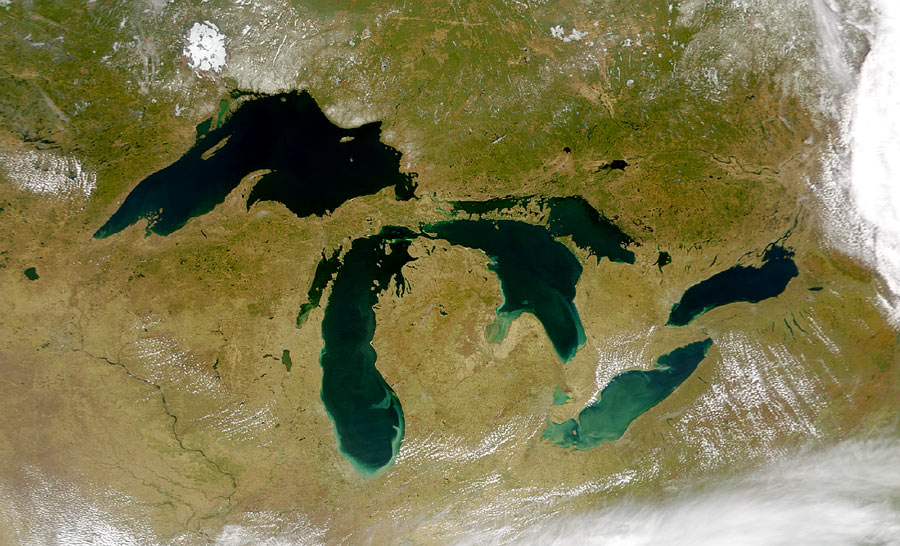In recent years, it has become relatively common knowledge that the Great Lakes Compact generally bans diversions of Great Lakes water outside the Great Lakes basin but offers limited exceptions. A community that straddles the basin line, or that lies within a county that straddles the basin line, may  apply for a diversion subject to certain stringent technical conditions. I have previously written in this space that the Compact has been successful at least insofar as the party states were able to agree on and subsequently enforce a common decision-making process to consider such requests. In October 2018, Compact supporters will celebrate its 10-year anniversary.
apply for a diversion subject to certain stringent technical conditions. I have previously written in this space that the Compact has been successful at least insofar as the party states were able to agree on and subsequently enforce a common decision-making process to consider such requests. In October 2018, Compact supporters will celebrate its 10-year anniversary.
But the Compact’s first decade has not passed without controversy, much of it centered on the diversion provisions generally and on southeastern Wisconsin in particular. In fact, during a recent conference keynote address here at the Law School’s Lubar Center, Compact expert Peter Annin noted that our area has more “diversion hotspots” than the other Compact party states combined. Consider that in 2009, the City of New Berlin (a straddling community) became the first community to successfully apply for a diversion, and in 2016, the City of Waukesha became the first community within a straddling county to successfully apply for a diversion.
Just last week, the region made Compact history for yet another reason. For the first time, opponents to an approved diversion have filed a legal action to challenge the approval in a state administrative hearing, potentially as a precursor to an appeal to Wisconsin circuit court. The proceedings to follow will provide important and novel insights on how to interpret the Compact. In January 2018, the City of Racine sought approval from the Wisconsin Department of Natural Resources (DNR) to divert 7 million gallons of water per day to serve part of the Village of Mount Pleasant, a straddling community, with most of the water going to serve the planned Foxconn industrial facility. Several other Compact party states voiced concerns about the proposal, but under the terms of the Compact the decision was DNR’s alone because Mount Pleasant is a straddling community (as contrasted with the Waukesha application, where each party State held a veto). In April, DNR granted the request.
Many analysts thought the Waukesha application would be the first to spawn a legal challenge, but that case was resolved after an informal hearing before the Compact Council. Instead, it is the Racine diversion that may be headed to court. Just last week, a group of parties opposed to the Racine diversion filed a petition with DNR seeking a contested case hearing to challenge DNR’s decision. The Compact’s dispute resolution procedure (consistent with Wisconsin law) requires such an administrative challenge as a prerequisite to a subsequent appeal to Wisconsin Circuit Court.
Substantively, the opponents’ position largely rests upon a single argument: that the diversion is not for “public water supply purposes,” as the Compact requires. The Compact defines “public water supply purposes” to mean “water distributed to the public through a physically connected system of treatment, storage, and distribution facilities serving a group of largely residential customers that may also serve industrial, commercial, and other institutional operators.” The opponents argue that the diversion for Foxconn’s use does not meet that test because it will serve an industrial customer.
DNR has not officially responded, but tipped its hand in a letter answering the concerns of the other Compact parties. DNR revealed that it views the issue from the perspective of the system as a whole, not the end user, and that it judged the matter by evaluating the number of water utility customers that are residential customers.
Specifically, DNR stated: “The definition of “Public Water Supply Purposes” requires a physically connected system that serves a group of largely residential customers. The requirement to serve largely residential customers in this definition applies to the water supply system within the straddling community. The Racine water utility is a physically connected system that serves a group of largely residential customers; approximately 90 percent of the Racine water utility customers are residential customers. In addition, of the approximately 6,000 customers Racine’s water utility serves in the Village of Mount Pleasant, about 90 percent are residential customers. Ninety-two percent of the land area of the Village of Mount Pleasant is in the Lake Michigan Basin. Public water supplied to the Straddling Community of Mount Pleasant is, and will remain, largely residential and therefore the diversion satisfies the requirement for “public water supply purposes.””
This sets up a complex and novel dispute over the meaning of the “public purposes” requirement in the Compact. Legal thinkers will readily conceive of other settings where courts have struggled to define similar “public use” tests, such as the Fifth Amendment’s requirement that “private property not be taken for public use, without just compensation” and the United States Supreme Court’s controversial Kelo decision interpreting that provision. But there is no certainty that any existing case law drawn from other areas of law will inform a court’s thinking in this context—far from it.
As this dispute plays out, Wisconsin courts may eventually have to confront the applicability, and perhaps even the constitutionality, of the part of 2017 Wisconsin Act 58 providing that the Wisconsin Supreme Court must directly take appeals “concerning” “Electronics and Information Technology Manufacturing Zones” (EITM) from the circuit courts, bypassing the usual appeal route through the court of appeals. (There is only one such zone, home to the Foxconn project). It is unclear whether this case “concerns” an EITM, given that it is a challenge to DNR’s approval of a request made by Racine for Mount Pleasant, without Foxconn being a party.
Whatever the outcome of the pending litigation, the Compact parties have suggested that more widespread action is needed to define “public water supply purposes” and perhaps even to conduct a “basin-wide evaluation of existing Straddling Communities and Straddling Counties to determine the overall eligibility and potential for future diversions.” That would be a burdensome undertaking, albeit one that would provide very useful data for future policy planning.


The water is all Foxconn is after. Our corrupt state government, running as an oligarchy, has decimated the Dept of Natural Resources. Scott Walker’s Cathy Stepp gutted the Wisconsin DNR laws with the systematic aid of the Republican majority state legislators who enact legislation written for them by corporate members of the American Legislative Exchange Council (ALEC), a corporate Republican Bill Mill.
Do you work/donate time and legal advice to/with ALEC?